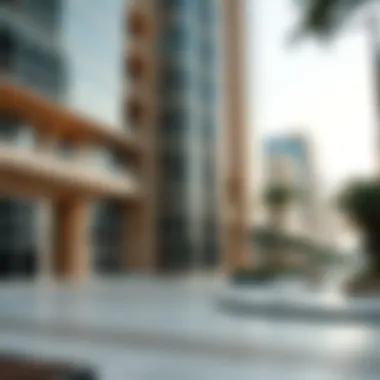Exploring Dubai Healthcare City 2: A Comprehensive Review


Property Market Overview
The healthcare sector in Dubai is evolving rapidly, and Dubai Healthcare City 2 stands at the forefront of this transformation. With its ambitious vision, it aims to provide world-class healthcare services and attract global investments. To grasp the significance of this development, it’s essential to take a closer look at the current trends within the property market surrounding the healthcare city.
Current Market Trends
An uptick in demand for healthcare services is evident in Dubai, reflecting a broader shift towards a health-centric lifestyle. The strategic location of Healthcare City 2 combined with the influx of international healthcare professionals is reshaping investor perception. Properties located nearby are becoming hotspots, not just for healthcare services but also for residential and commercial investments.
In recent years, the Dubai land market has seen a marked increase in pricing, driven largely by significant developments like Healthcare City 2. Investors are keenly eyeing properties within this radius due to favorable returns on investment, which are being buoyed by the increased footfall from patients and visitors. A noticeable trend is the blending of commercial and residential offerings, catering to those working in or visiting the healthcare sector.
Key Statistics and Performance Indicators
The key indicators reflecting the market performance speak volumes about its potential:
- Average Property Price Growth: Recent analysis indicates property values in the area surrounding Healthcare City 2 climbed by approximately 15% over the past year.
- Occupancy Rates: Current occupancy rates for commercial spaces around the healthcare city hover near 90%, indicating a robust demand.
- Investment Opportunities: Reports show that real estate investments in healthcare-related properties yield returns between 10-12%, significantly outperforming many other sectors in Dubai.
These statistics serve as compass points for investors and professionals. Understanding these trends is paramount for making informed decisions within the burgeoning healthcare property market.
Investment Opportunities
As Dubai Healthcare City 2 continues to expand, it presents a wealth of investment opportunities that both seasoned investors and newcomers can leverage.
Emerging Neighborhoods for Investment
Several neighborhoods adjacent to Dubai Healthcare City 2 are emerging as attractive investment spots. Areas like Al Jaddaf and Dubai Design District are gaining attention, driven by their proximity to the healthcare hub. Investors are also looking at developing mixed-use properties that offer both residential and commercial spaces. This model not only caters to healthcare professionals but also to families drawn to the area for its educational and recreational amenities.
Buying vs. Renting: Pros and Cons
For individuals and businesses deciding between buying or renting properties in this area, here are some factors to consider:
Buying
- Pros:
- Cons:
- Long-term investment with potential for growth.
- Ownership offers stability, especially for healthcare practitioners.
- Ability to customize or renovate spaces.
- Requires a higher initial capital outlay.
- Maintenance responsibilities lie entirely with the owner.
Renting
- Pros:
- Cons:
- Lower upfront costs and flexibility in lease terms.
- Landlords typically handle property maintenance.
- No equity building; rent payments offer no long-term financial return.
- Lower stability compared to ownership during lease renewals.
The chosen path depends on individual circumstances, investment goals, and risk tolerance. Ultimately, the decision should align with the broader vision for engaging with Dubai’s healthcare sector.
"Dubai's healthcare scene is set to become a driving force in the region, and understanding the real estate component is essential for stakeholders."
Closure
As we analyze Dubai Healthcare City 2, the fusion of healthcare innovation with real estate investment opportunities becomes clear. The landscape is shifting, and those equipped with the necessary insights are likely to reap the benefits of this evolution.
Preface to Dubai Healthcare City
Dubai Healthcare City 2 stands as a beacon of ambition in the health sector, aiming to reshape healthcare not only in Dubai but throughout the entire region. This project, an enhancement of the original Dubai Healthcare City, aligns with the broader goals of the UAE to be a global healthcare hub. As we delve into this topic, it’s crucial to understand various elements that add to its significance. This initiative is not merely about constructing buildings but fostering an entire ecosystem that integrates healthcare services, cutting-edge technology, and wellness.
In the current global context, the healthcare industry is rapidly evolving. New technologies, changing patient expectations, and an emphasis on quality health outcomes create a pivotal moment for stakeholders involved in healthcare delivery. Investors, professionals, and policymakers are closely watching how Dubai Healthcare City 2 progresses, as it may set a benchmark for other nations. The project’s design touches not just on physical infrastructure but also on creating a sustainable model of health management.
Key considerations include:
- The integration of smart healthcare solutions and innovative operations methods that can enhance patient care.
- Establishing regulatory standards that ensure compliance while promoting excellence in services.
- The long-term impact this city has on the overall economy and public health priorities in Dubai.


By focusing on these elements, we begin to appreciate the full scope of what Dubai Healthcare City 2 represents. This article will explore various dimensions of the project, including it’s strategic positioning, the groundwork for health standards, and the investment prospects that arise in such a burgeoning environment.
"Dubai Healthcare City 2 isn't just another development; it's a paradigm shift in how healthcare is perceived and delivered in the region."
Understanding these nuances will provide investors and professionals with a clear picture of the opportunities that lie ahead. Furthermore, exploring the key objectives of this development will deepen the understanding of its potential impact on healthcare delivery and urban growth.
Strategic Importance of Dubai Healthcare City
The landscape of healthcare is constantly evolving, influenced by advancements in technology, shifts in regulatory frameworks, and changing patient needs. Dubai Healthcare City 2 emerges as a focal point in this transformation, reinforcing its strategic importance not just within Dubai but across the wider UAE healthcare agenda. This section will shine a light on the core elements that underline the significance of Dubai Healthcare City 2 in shaping a world-class healthcare system.
Positioning within the UAE's Healthcare Agenda
Dubai Healthcare City 2 is not just a development; it is a cornerstone of the UAE's vision to establish itself as a leading global healthcare hub. The strategic positioning of this initiative aligns seamlessly with national policies aimed at enhancing healthcare access and quality. The UAE government has made substantial investments in healthcare infrastructure intended to boost the performance of the sector.
"Healthcare is not just a sector; it’s a lifeline. Dubai Healthcare City 2 aims to bolster that lifeline in the UAE."
Among the notable outlines of this agenda are initiatives focused on increasing the availability of healthcare services, promoting medical tourism, and accommodating a growing population. By concentrating medical facilities, educational institutions, and research centers in one area, Dubai Healthcare City 2 promotes collaboration and innovation.
Furthermore, the project is intended to facilitate international partnerships, attracting healthcare institutions from around the world. This not only enhances the diverse range of services available to citizens but also positions Dubai as a go-to destination for healthcare services, thereby driving economic growth.
Implications for Regional Healthcare Standards
The implications of Dubai Healthcare City 2 extend well beyond its borders, raising the bar for healthcare standards in the region. By adopting international best practices and setting high standards for healthcare delivery, it serves as a blueprint that could influence neighboring countries. The rigorous licensing and compliance processes in place ensure that only top-tier facilities operate within this ecosystem.
Additionally, the focus on continuous medical education and training helps maintain a workforce that is well-equipped to handle emerging challenges in the healthcare sector. The integration of the latest technologies—notably telemedicine and data analytics—further enhances patient care, pushing the envelope on what quality healthcare should look like in the 21st century.
Key Features of Dubai Healthcare City
Dubai Healthcare City 2 stands as a monumental advancement in the realm of healthcare infrastructure, reflecting aspirations not just to build a facility, but a holistic ecosystem dedicated to health and well-being. This superstructure allows providers, investors, and technologists to converge and innovate, enabling a significant improvement in healthcare services that meet the evolving demands of society. The features associated with this project are integral to understanding its potential influence on local, regional, and even global healthcare paradigms.
Architectural Design and Infrastructure
One of the standout attributes of Dubai Healthcare City 2 is its architectural ingenuity. Designed to optimize functionality while maintaining aesthetic appeal, the layout promotes an efficient flow of people, information, and services within the precinct. The integration of natural light in workspaces aids not only in creating a calming environment but also contributes to the productivity of healthcare personnel and the recovery of patients.
"Architecture is the art of how to waste space." - Philip Johnson
This integrated design approach not only balances form and function, but it’s also built with sustainability in mind. Water-saving technologies and renewable energy sources are embedded into the design, ensuring that the healthcare city minimizes its environmental footprint while maximizing operational efficiency.
Integration of Technology in Healthcare Delivery
In the current age of rapid technological innovation, the introduction of advanced technologies is paramount for enhancing healthcare delivery. Dubai Healthcare City 2 pioneers this integration, demonstrating myriad advantages for both providers and patients alike.
Telemedicine Innovations
Telemedicine is revolutionizing healthcare delivery by bridging gaps in access and improving patient engagement. Within the context of Dubai Healthcare City 2, telemedicine initiatives facilitate real-time medical consultations, empowering patients who may otherwise have limited access to healthcare resources. This model allows practitioners to reach a broader audience and provide timely intervention where necessary.
A key characteristic of telemedicine innovations lies in their ability to offer convenience; healthcare providers can deliver services from remote locations without patients having to navigate traffic or endure long waiting times. The unique feature of these innovations is the use of secure video conferencing technologies, which ensure confidentiality while allowing for comprehensive assessments. Moreover, this method significantly lowers overhead costs, making care more affordable.
Despite the numerous advantages, such as increased accessibility, there can be concerns regarding the reliability of technology and patient satisfaction. Nonetheless, as telecommunications technology advances further, these challenges appear surmountable.
Data Analytics in Patient Care
The integration of data analytics in patient care represents another powerful advantage that Dubai Healthcare City 2 embraces. The ability to collect and analyze vast amounts of patient data not only enhances care quality but also leads to improved treatment outcomes.
A defining characteristic of data analytics lies in its capacity to inform decision-making processes. For instance, healthcare providers can leverage analytics to identify trends, predict patient needs, and allocate resources optimally. One unique feature of this approach is the utilization of predictive analytics to foresee potential health crises, enabling preventive measures before conditions escalate.
While the benefits of data analytics are apparent – such as personalized care and enhanced operational efficiency – drawbacks can manifest, mainly in the form of data privacy concerns. As stewards of such sensitive information, healthcare institutions must navigate the balance between leveraging analytics for improved patient outcomes and safeguarding patient data.
The key features defined above illustrate not only the potential for innovation within Dubai Healthcare City 2 but also its commitment to fostering an environment conducive to the advancement of healthcare services that transcend traditional boundaries.
Investment Opportunities in Dubai Healthcare City
Investment in Dubai Healthcare City 2 offers a unique amalgamation of healthcare and real estate prospects. Within the framework of Dubai's booming economy, this healthcare complex presents unmatched avenues for growth, driven by the progressive healthcare agenda and urban innovation strategies. As one of the UAE’s prominent healthcare initiatives, it is essential for investors to understand how this project can align with their objectives while reaping significant benefits.


Both local and foreign investors are increasingly recognizing the extensive potential of this sector. They come equipped with the foresight that healthcare investments often yield long-term returns, particularly in a region where population growth and health awareness are on the rise. Benefitting from the robust infrastructure, investors can find themselves in a lucrative position by engaging with the various elements that contribute to Dubai's healthcare landscape.
Real Estate Prospects for Investors
Positioning oneself in the real estate segment of Dubai Healthcare City 2 is an enticing opportunity. The mix of state-of-the-art clinics, hospitals, and wellness centers — all housed within a meticulously planned environment — makes it an attractive venture for those involved in property development.
- High Demand for Healthcare Facilities: With an increasing number of expatriates and residents seeking premium healthcare services, there is a growing demand for specialized medical facilities. This demand could lead to increased occupancy rates and steady revenue streams for property owners.
- Strategic Location: The integrated layout of Dubai Healthcare City 2, with easy access to major transportation hubs, allows investors to tap into a broader market, drawing patients from all walks of life — both locals and international clients eager for advanced healthcare services.
- Regulatory Incentives: The local government’s determination to reform healthcare can serve as an advantage. Policies promoting foreign direct investment often mean reduced taxes or other financial incentives — making it easier for investors to establish and expand their presence.
*"Investing in Dubai Healthcare City 2 is not just about real estate; it’s about being part of a transformative healthcare narrative."
Potential for Healthcare Startups and Ventures
In an era defined by innovation, Dubai Healthcare City 2 emerges as a fertile ground for healthcare startups. Entrepreneurs and established firms can benefit immensely as this environment fosters high-tech solutions and creative approaches to modern medical challenges.
- Access to Resources: Numerous incubators and accelerators focus on health tech within Dubai Healthcare City 2, providing startups with the infrastructure, mentorship, and funding opportunities required for growth. This nurturing will enable fresh ideas, which can revolutionize patient care.
- Collaborative Ecosystem: Within the city, numerous healthcare institutions operate alongside educational facilities and research centers. This creates networking opportunities, allowing startups to collaborate with seasoned professionals and leverage existing expertise.
- Market Need: As global health trends evolve towards personalized medicine, digital health technologies, and telehealth solutions, Dubai Healthcare City 2 allows startups to quickly connect with clients, addressing their immediate healthcare needs directly through innovative approaches.
Investing in the healthcare startup landscape in Dubai Healthcare City 2 not only creates financial gains but also leads to meaningful advancements in patient care and medical research.
In summary, whether one's interest lies in the property sector or the burgeoning field of healthcare innovation, Dubai Healthcare City 2 stands as a beacon of potential, beckoning investors to delve into its multifaceted offerings.
Regulatory Framework Governing Healthcare City
The regulatory framework surrounding Healthcare City 2 serves as the backbone for its operations, ensuring that the facilities and services provided meet high standards of quality and safety. This framework is pivotal in fostering a conducive environment for healthcare investors and professionals by establishing clear guidelines and robust protocols.
Licensing for Healthcare Institutions
One of the key aspects of the regulatory framework is the licensing process for healthcare institutions. This process involves rigorous assessment to ensure only qualified providers can operate within the city. The authorities require various documentation including clinical protocols, financial viability studies, and safety regulations compliance before issuing licenses. Such stringent measures not only safeguard patient welfare but also enhance the overall trustworthiness of the healthcare landscape in Dubai.
Benefits of Licensing:
- Quality Assurance: Licensing acts as a quality control mechanism, ensuring that service providers adhere to internationally recognized standards.
- Accountability: Licensed institutions are held accountable for the care they provide, allowing for recourse in cases where standards are breached.
- Market Credibility: Positive reviews and accreditations boost confidence among investors and patients alike, which is essential for the long-term success of healthcare ventures.
Compliance with International Healthcare Standards
For Healthcare City 2, compliance with international healthcare standards is not just a regulatory obligation; it's a strategic move to attract a global clientele. The city aligns itself with guidelines set by bodies such as the World Health Organization (WHO) and the Joint Commission International (JCI). Following these standards elevates the quality of care and positions Healthcare City 2 prominently in the international healthcare arena.
Key Aspects of Compliance:
- Patient Safety: Adhering to international standards reduces medical errors, enhancing patient safety and satisfaction.
- Global Partnerships: Compliance opens doors for collaborations with leading healthcare institutions worldwide, fostering a culture of innovation and knowledge-sharing.
- Increased Trust: Meeting global standards builds trust not only among patients but also with investors, giving them confidence that their investments are safeguarded by reliable practices.
Compliance and licensing together form a robust regulatory framework vital for the sustainability and growth of Healthcare City 2, ensuring its competitiveness on a global scale.
As Healthcare City 2 continues to evolve, its regulatory structures will undoubtedly play a critical role in shaping its future, making it a compelling proposition for stakeholders in the healthcare industry.
For more detailed information about healthcare regulations, you can visit WHO, and to understand international standards, refer to JCI.
Impact on the Healthcare Workforce
The growth and development of Dubai Healthcare City 2 signifies much more than an architectural marvel or a hub for healthcare facilities; it plays a pivotal role in shaping the healthcare workforce in the region. As this enclave continues to expand, the implications for human resources in the healthcare sector cannot be overlooked.
Considering the complexities of modern healthcare, the demand for skilled professionals is skyrocketing. Dubai Healthcare City 2 aims to be a key player in fulfilling this demand by providing avenues for attracting top-tier talent and fostering a competitive climate in healthcare expertise.
Engagement with a diverse pool of professionals not only enriches the sector but also ensures that the standards of patient care remain elevated. With the integration of cutting-edge technologies, Dubai Healthcare City 2 is determined to create a workforce that is not only well-versed in traditional healthcare methods, but also adaptable to new challenges and innovations.
"A well-trained healthcare workforce is the backbone of any successful healthcare system; it determines the efficacy and quality of the services provided."
Talent Acquisition Strategies
The quest for skilled professionals in Dubai Healthcare City 2 begins with effective talent acquisition strategies. Healthcare organizations here must adapt to a competitive hiring environment, which involves a thoughtful approach to recruitment practices. Highlighting the numerous positives of working within this thriving ecosystem is crucial.
Some specific strategies include:
- Showcasing Growth Opportunities: Emphasizing career progression and learning avenues can attract ambitious candidates who are keen on personal development.
- Collaboration with Educational Institutions: Partnering with medical schools and universities can help create a pipeline of fresh talent ready to step into the field equipped with relevant knowledge.
- International Recruitment: Dubai Healthcare City 2 can recruit globally and specifically target areas with a surplus of healthcare professionals, such as Europe and North America.


Moreover, leveraging platforms like LinkedIn and niche job portals can enhance visibility for vacancies. Communicating the unique offerings of working within Dubai Healthcare City 2—such as modern facilities and innovative practices—can make the city a beacon for healthcare talent.
Training and Development Initiatives
Once the right talent has been acquired, sustaining their eagerness and proficiency necessitates robust training and development initiatives. It's about investing in people, ensuring they are deftly equipped to meet the evolving needs of healthcare.
Effective training programs can cover a wide area, such as:
- Clinical Skills Development: Focused workshops and hands-on training can keep the workforce updated with the latest methodologies in patient care.
- Technology Familiarization: With rapid advancements in telemedicine and patient management platforms, training should encompass comprehensive knowledge in utilizing these technologies to enhance service delivery.
- Cultural Competency Training: Given Dubai's multicultural landscape, equipping employees with skills to engage effectively with diverse populations is essential for providing effective care.
Additionally, mentorship programs can be established where experienced practitioners guide newer entrants. This form of practical knowledge transfer is invaluable and helps fortify bonds within the workforce.
In summary, the greater healthcare ecosystem surrounding Dubai Healthcare City 2 stands to benefit significantly from strategic talent acquisition and dedicated training initiatives. As the landscape continues to evolve, honing the skills and expertise of healthcare professionals here is essential to enhancing the region’s healthcare delivery capabilities.
Community Impact and Engagement
The significance of community impact within Dubai Healthcare City 2 cannot be overstated. This development is not merely a collection of hospitals and clinics; it acts as a beacon of hope for health and wellness in the region. The human element of healthcare often gets overshadowed by statistics and advancements in technology. However, the interaction between the healthcare institutions and the surrounding communities is where the true essence of healthcare is captured. Fostering an environment that prioritizes community engagement leads to a myriad of benefits that ripple through both the healthcare ecosystem and local populations.
Sustainability Practices in Healthcare City
Sustainability is a core tenet driving the planning and implementation of Healthcare City 2. The facility implements eco-friendly practices that not only reduce its carbon footprint but also enhance the overall well-being of its inhabitants. Here are some noteworthy practices:
- Green Building Standards: Most structures within the healthcare city comply with international sustainable building standards such as LEED (Leadership in Energy and Environmental Design). Using sustainable materials helps lower energy consumption and minimizes waste.
- Renewable Energy: Solar panels and wind turbines are integrated into the architectural plans to produce clean energy. This effort promotes a self-sufficient environment that reduces reliance on non-renewable energy sources.
- Waste Management: Innovative waste management systems are employed, ensuring that waste from hospitals and clinics is sorted, recycled, or disposed of responsibly. This focus not only aids the environment but also reinforces health standards by minimizing potential health hazards.
- Water Conservation: Implementing efficient water systems is pivotal as it supports both environmental sustainability and community interests. Rainwater harvesting and greywater recycling systems are a part of the initiative.
Such sustainability practices showcase a commitment to protecting the environment while promoting public health. They serve as a model for future projects within the UAE and beyond.
Engagement with Local Communities
Engaging local communities is essential for the resonation of Dubai Healthcare City 2 within its vicinity. Creating a robust connection between healthcare providers and the community nurtures trust and promotes better health outcomes. Here’s how the development engages effectively with local populations:
- Outreach Programs: Regular health awareness campaigns and free screening drives are conducted to educate locals on preventive healthcare. These initiatives demystify medical procedures and empower people to take charge of their health.
- Feedback Mechanisms: Direct lines of communication are established to facilitate feedback from community members. This helps healthcare providers understand local health trends and needs, tailoring services accordingly.
- Partnerships with Local Organizations: Collaborations with schools, nonprofit organizations, and businesses build a network of support to reach wider audiences. Local organizations can bring unique perspectives into shaping health programs that align with community goals.
- Cultural Sensitivity: Special attention is given to cultural practices and values when designing healthcare initiatives. This enhances accessibility and acceptance, allowing healthcare practices to be integrated seamlessly into community life.
Engagement strategies bolster community trust and enhance the overall healthcare landscape. Understanding the unique needs of the community fosters inclusive healthcare solutions that resonate widely.
"Effective healthcare is not just about treating illness; it's about cultivating relationships and building a community that prioritizes well-being."
Future Prospects for Dubai Healthcare City
The future of Dubai Healthcare City 2 is a topic of considerable import. This section unpacks the potential trajectory of this initiative, examining vital elements that could shape its growth and development. Given the rapid evolution of the healthcare landscape globally, understanding what's on the horizon for this healthcare hub is critical for various stakeholders, including investors, healthcare professionals, and the local government.
The prospects are not merely about physical expansion; they encompass advancements in technology, regulatory enhancements, and shifts in community engagement. As Dubai continues to position itself as a global healthcare destination, the implications of these factors are profound.
Projected Growth and Development Phases
Dubai Healthcare City 2 is set to undergo a multi-phase development approach designed to incrementally enhance its medical infrastructure. The projected growth spans over the next decade and beyond, laying down a roadmap filled with strategic milestones. Notable phases include:
- Phase One: Establishing primary healthcare facilities and diagnostic centers, ensuring immediate access to necessary care.
- Phase Two: The introduction of specialized clinics and hospitals that focus on innovative treatments and cutting-edge medical technology.
- Phase Three: Expansion into research and educational institutions collaborating with international universities to foster knowledge and skill development.
The timeline for these phases is not rigid. It allows for flexibility and adaptation based on market demand and technological innovations. This approach ensures that Dubai Healthcare City 2 isn't just reacting to trends but actively creating opportunities.
Long-Term Vision for Healthcare in Dubai
The long-term vision for healthcare in Dubai extends far beyond traditional frameworks. The city's ambitions are ambitious, aiming to create a healthcare ecosystem that not only meets local needs but also stands out on a global scale. Some critical focus areas include:
- Integration of Smart Technologies: Creating a seamless merge between patient care and technology through AI and data analytics.
- Patient-Centric Models: Transitioning from a volume-driven care system to one hinged on patient satisfaction and outcomes.
- Sustainability Initiatives: Developing green facilities that minimize environmental impact while maximizing efficiency.
This vision is not just aspirational; it's grounded in Dubai's commitment to maintaining its status as a leader in healthcare innovation.
In summary, the future prospects for Dubai Healthcare City 2 are bright and poised for transformative change. Stakeholders must stay attuned to evolving trends and challenges while aligning their strategies to capitalize on the opportunities this vibrant healthcare zone presents.
Ending
The conclusion serves as the capstone of this exploration into Dubai Healthcare City 2, emphasizing its significance within the broader spectrum of healthcare development in the UAE. It is not merely a summary of preceding sections but rather an opportunity to connect the dots between the insights and analyses presented throughout the article. In today's increasingly competitive healthcare sector, understanding such a landmark initiative is essential for a multitude of stakeholders, including investors, professionals, and policymakers.
Summary of Key Insights
The following key insights highlight the pertinent elements of Dubai Healthcare City 2:
- Strategic Growth: The initiative positions Dubai as a healthcare hub in the region, aiming to attract global talent and foster innovation in patient care, thus competing on an international scale.
- Investment Opportunities: The available prospects for real estate and healthcare startups are not just limited to major corporate interests but extend to local businesses and beyond, creating a diversified ecosystem.
- Regulatory Framework: A robust set of regulations ensures that healthcare institutions within the city adhere to international standards, enhancing their credibility.
- Technological Integration: The use of advanced technologies, such as telemedicine and big data analytics, supports efficient healthcare service delivery and promotes holistic patient care.
- Community Engagement: Sustainability and community interface practices are indicative of the initiative's commitment to holistic development, reaffirming its social responsibility.







